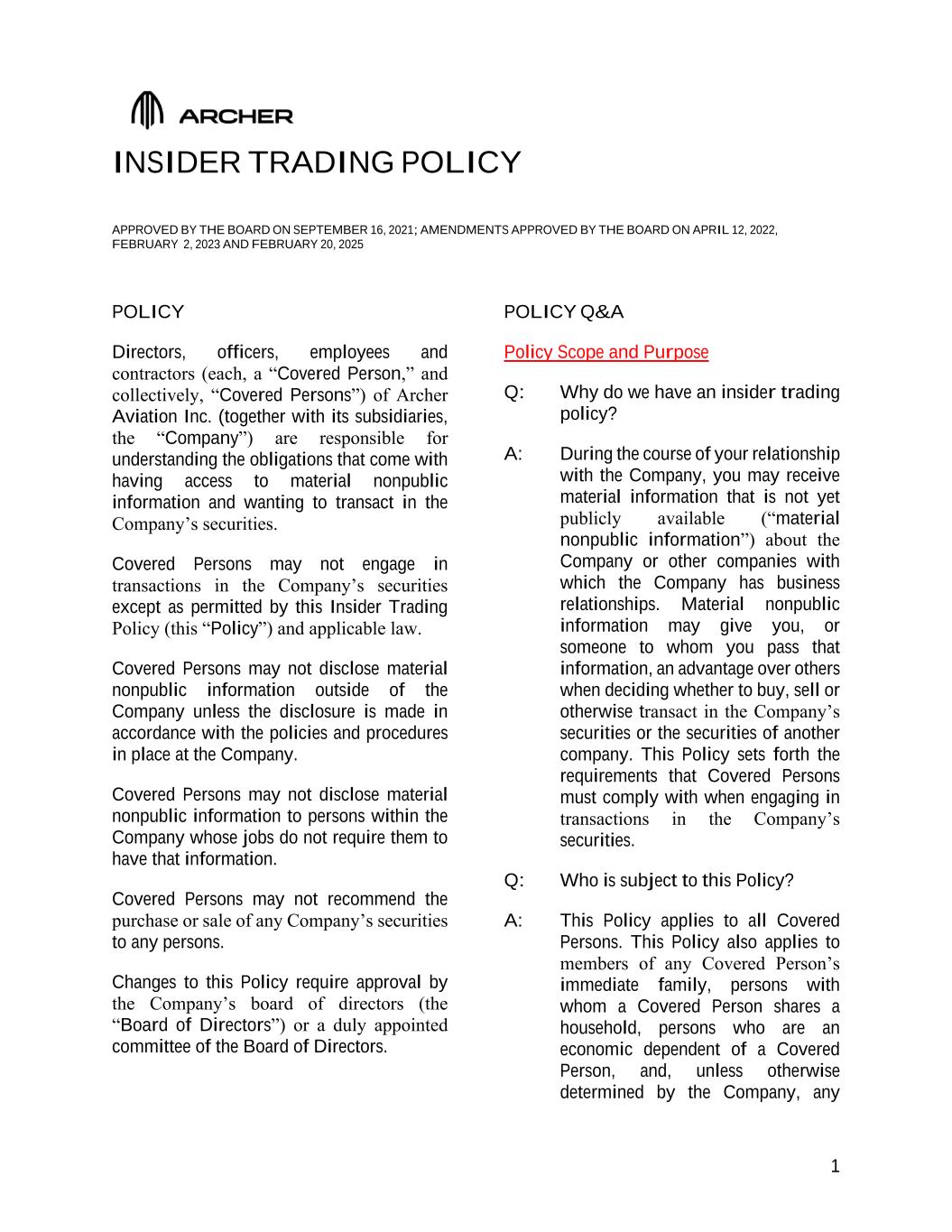
INSIDER TRADING POLICY APPROVED BY THE BOARD ON SEPTEMBER 16, 2021; AMENDMENTS APPROVED BY THE BOARD ON APRIL 12, 2022, FEBRUARY 2, 2023 AND FEBRUARY 20, 2025 1 POLICY Directors, officers, employees and contractors (each, a “Covered Person,” and collectively, “Covered Persons”) of Archer Aviation Inc. (together with its subsidiaries, the “Company”) are responsible for understanding the obligations that come with having access to material nonpublic information and wanting to transact in the Company’s securities. Covered Persons may not engage in transactions in the Company’s securities except as permitted by this Insider Trading Policy (this “Policy”) and applicable law. Covered Persons may not disclose material nonpublic information outside of the Company unless the disclosure is made in accordance with the policies and procedures in place at the Company. Covered Persons may not disclose material nonpublic information to persons within the Company whose jobs do not require them to have that information. Covered Persons may not recommend the purchase or sale of any Company’s securities to any persons. Changes to this Policy require approval by the Company’s board of directors (the “Board of Directors”) or a duly appointed committee of the Board of Directors. POLICY Q&A Policy Scope and Purpose Q: Why do we have an insider trading policy? A: During the course of your relationship with the Company, you may receive material information that is not yet publicly available (“material nonpublic information”) about the Company or other companies with which the Company has business relationships. Material nonpublic information may give you, or someone to whom you pass that information, an advantage over others when deciding whether to buy, sell or otherwise transact in the Company’s securities or the securities of another company. This Policy sets forth the requirements that Covered Persons must comply with when engaging in transactions in the Company’s securities. Q: Who is subject to this Policy? A: This Policy applies to all Covered Persons. This Policy also applies to members of any Covered Person’s immediate family, persons with whom a Covered Person shares a household, persons who are an economic dependent of a Covered Person, and, unless otherwise determined by the Company, any
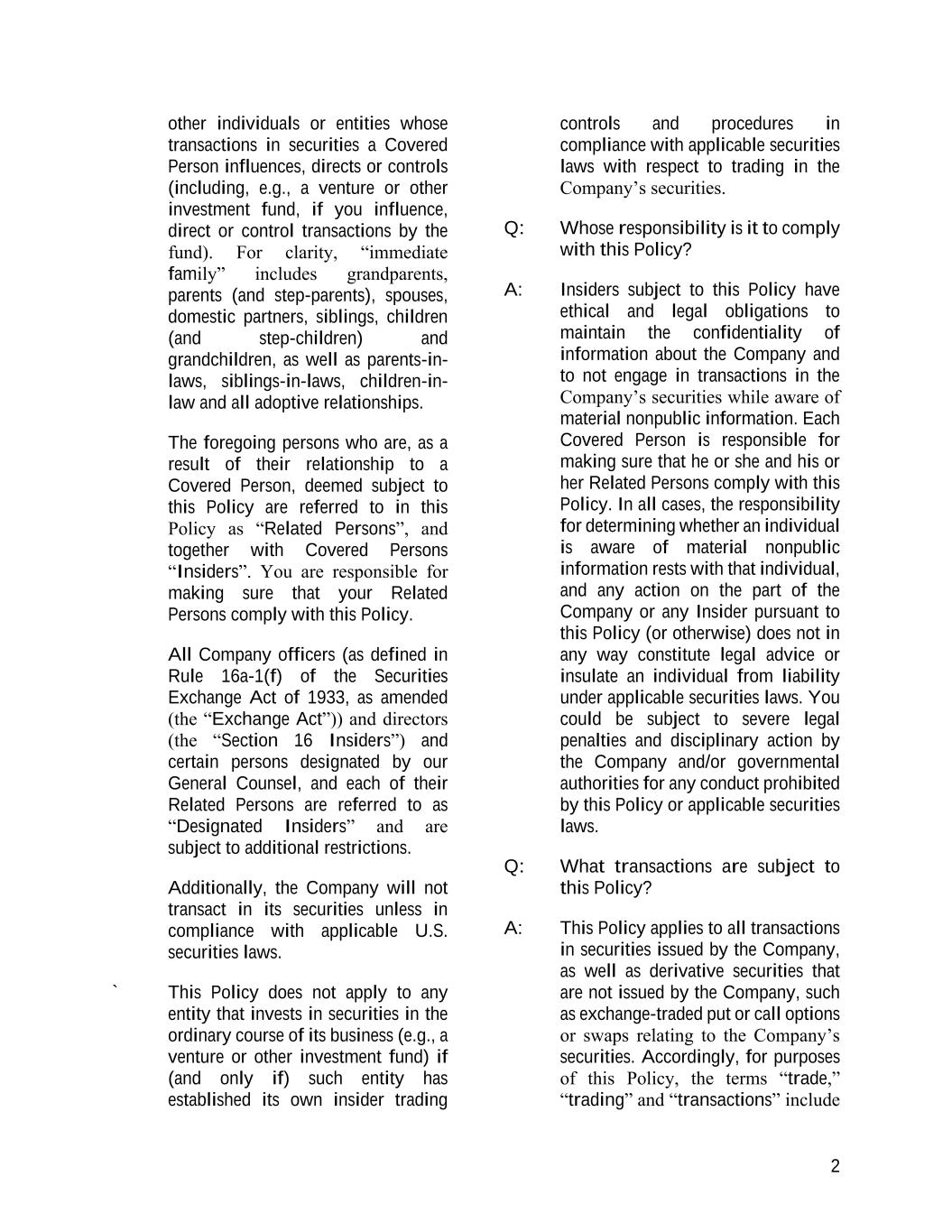
2 other individuals or entities whose transactions in securities a Covered Person influences, directs or controls (including, e.g., a venture or other investment fund, if you influence, direct or control transactions by the fund). For clarity, “immediate family” includes grandparents, parents (and step-parents), spouses, domestic partners, siblings, children (and step-children) and grandchildren, as well as parents-in- laws, siblings-in-laws, children-in- law and all adoptive relationships. The foregoing persons who are, as a result of their relationship to a Covered Person, deemed subject to this Policy are referred to in this Policy as “Related Persons”, and together with Covered Persons “Insiders”. You are responsible for making sure that your Related Persons comply with this Policy. All Company officers (as defined in Rule 16a-1(f) of the Securities Exchange Act of 1933, as amended (the “Exchange Act”)) and directors (the “Section 16 Insiders”) and certain persons designated by our General Counsel, and each of their Related Persons are referred to as “Designated Insiders” and are subject to additional restrictions. Additionally, the Company will not transact in its securities unless in compliance with applicable U.S. securities laws. ` This Policy does not apply to any entity that invests in securities in the ordinary course of its business (e.g., a venture or other investment fund) if (and only if) such entity has established its own insider trading controls and procedures in compliance with applicable securities laws with respect to trading in the Company’s securities. Q: Whose responsibility is it to comply with this Policy? A: Insiders subject to this Policy have ethical and legal obligations to maintain the confidentiality of information about the Company and to not engage in transactions in the Company’s securities while aware of material nonpublic information. Each Covered Person is responsible for making sure that he or she and his or her Related Persons comply with this Policy. In all cases, the responsibility for determining whether an individual is aware of material nonpublic information rests with that individual, and any action on the part of the Company or any Insider pursuant to this Policy (or otherwise) does not in any way constitute legal advice or insulate an individual from liability under applicable securities laws. You could be subject to severe legal penalties and disciplinary action by the Company and/or governmental authorities for any conduct prohibited by this Policy or applicable securities laws. Q: What transactions are subject to this Policy? A: This Policy applies to all transactions in securities issued by the Company, as well as derivative securities that are not issued by the Company, such as exchange-traded put or call options or swaps relating to the Company’s securities. Accordingly, for purposes of this Policy, the terms “trade,” “trading” and “transactions” include
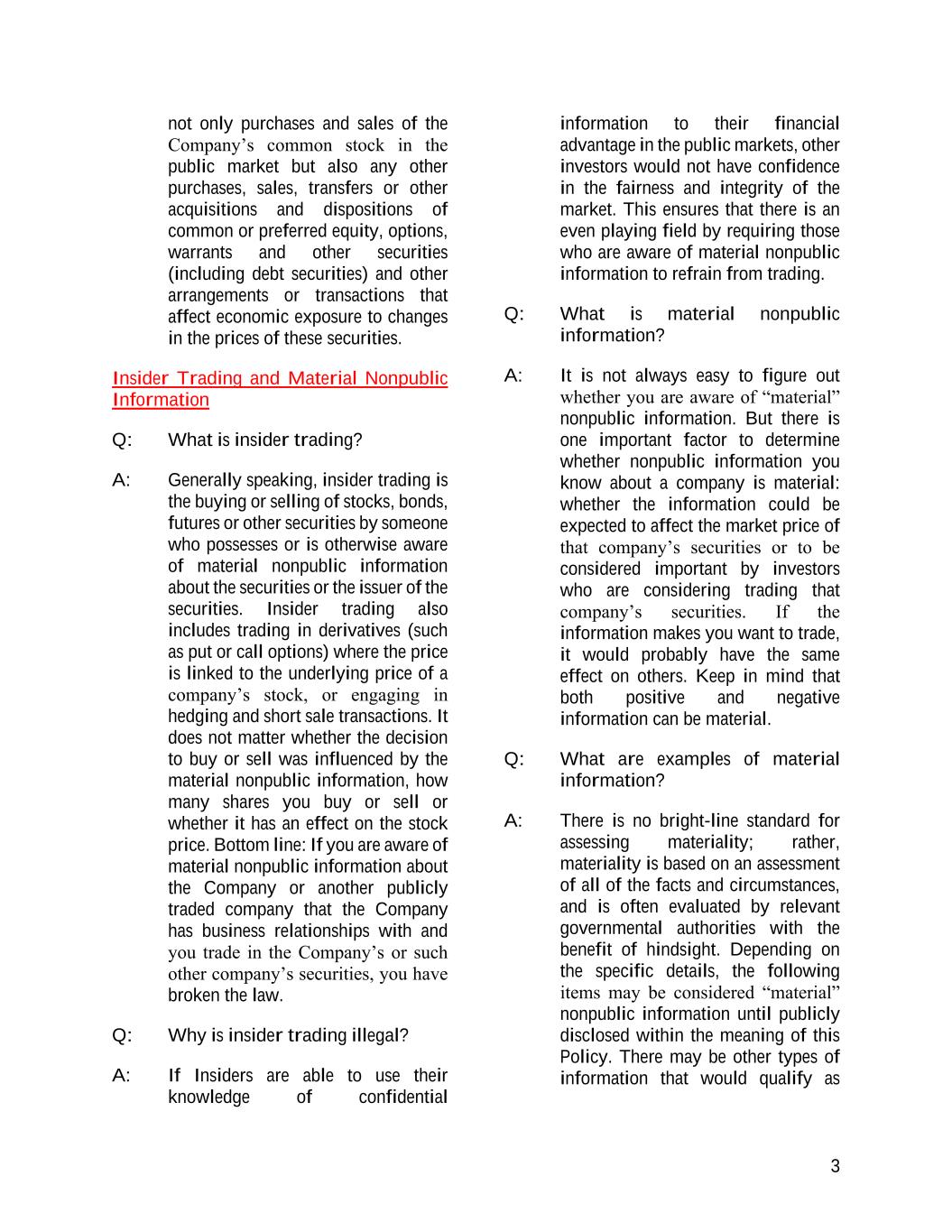
3 not only purchases and sales of the Company’s common stock in the public market but also any other purchases, sales, transfers or other acquisitions and dispositions of common or preferred equity, options, warrants and other securities (including debt securities) and other arrangements or transactions that affect economic exposure to changes in the prices of these securities. Insider Trading and Material Nonpublic Information Q: What is insider trading? A: Generally speaking, insider trading is the buying or selling of stocks, bonds, futures or other securities by someone who possesses or is otherwise aware of material nonpublic information about the securities or the issuer of the securities. Insider trading also includes trading in derivatives (such as put or call options) where the price is linked to the underlying price of a company’s stock, or engaging in hedging and short sale transactions. It does not matter whether the decision to buy or sell was influenced by the material nonpublic information, how many shares you buy or sell or whether it has an effect on the stock price. Bottom line: If you are aware of material nonpublic information about the Company or another publicly traded company that the Company has business relationships with and you trade in the Company’s or such other company’s securities, you have broken the law. Q: Why is insider trading illegal? A: If Insiders are able to use their knowledge of confidential information to their financial advantage in the public markets, other investors would not have confidence in the fairness and integrity of the market. This ensures that there is an even playing field by requiring those who are aware of material nonpublic information to refrain from trading. Q: What is material nonpublic information? A: It is not always easy to figure out whether you are aware of “material” nonpublic information. But there is one important factor to determine whether nonpublic information you know about a company is material: whether the information could be expected to affect the market price of that company’s securities or to be considered important by investors who are considering trading that company’s securities. If the information makes you want to trade, it would probably have the same effect on others. Keep in mind that both positive and negative information can be material. Q: What are examples of material information? A: There is no bright-line standard for assessing materiality; rather, materiality is based on an assessment of all of the facts and circumstances, and is often evaluated by relevant governmental authorities with the benefit of hindsight. Depending on the specific details, the following items may be considered “material” nonpublic information until publicly disclosed within the meaning of this Policy. There may be other types of information that would qualify as
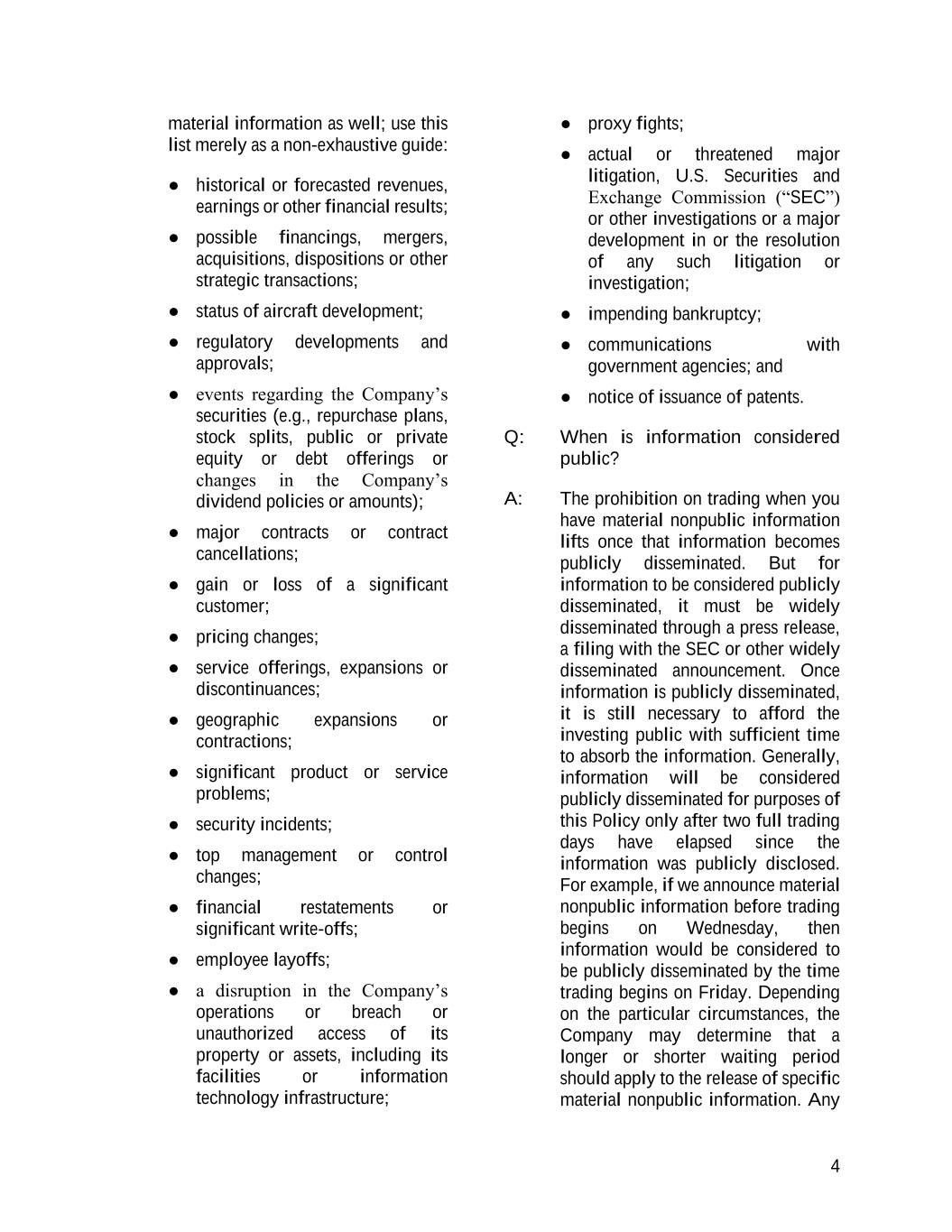
4 material information as well; use this list merely as a non-exhaustive guide: ● historical or forecasted revenues, earnings or other financial results; ● possible financings, mergers, acquisitions, dispositions or other strategic transactions; ● status of aircraft development; ● regulatory developments and approvals; ● events regarding the Company’s securities (e.g., repurchase plans, stock splits, public or private equity or debt offerings or changes in the Company’s dividend policies or amounts); ● major contracts or contract cancellations; ● gain or loss of a significant customer; ● pricing changes; ● service offerings, expansions or discontinuances; ● geographic expansions or contractions; ● significant product or service problems; ● security incidents; ● top management or control changes; ● financial restatements or significant write-offs; ● employee layoffs; ● a disruption in the Company’s operations or breach or unauthorized access of its property or assets, including its facilities or information technology infrastructure; ● proxy fights; ● actual or threatened major litigation, U.S. Securities and Exchange Commission (“SEC”) or other investigations or a major development in or the resolution of any such litigation or investigation; ● impending bankruptcy; ● communications with government agencies; and ● notice of issuance of patents. Q: When is information considered public? A: The prohibition on trading when you have material nonpublic information lifts once that information becomes publicly disseminated. But for information to be considered publicly disseminated, it must be widely disseminated through a press release, a filing with the SEC or other widely disseminated announcement. Once information is publicly disseminated, it is still necessary to afford the investing public with sufficient time to absorb the information. Generally, information will be considered publicly disseminated for purposes of this Policy only after two full trading days have elapsed since the information was publicly disclosed. For example, if we announce material nonpublic information before trading begins on Wednesday, then information would be considered to be publicly disseminated by the time trading begins on Friday. Depending on the particular circumstances, the Company may determine that a longer or shorter waiting period should apply to the release of specific material nonpublic information. Any
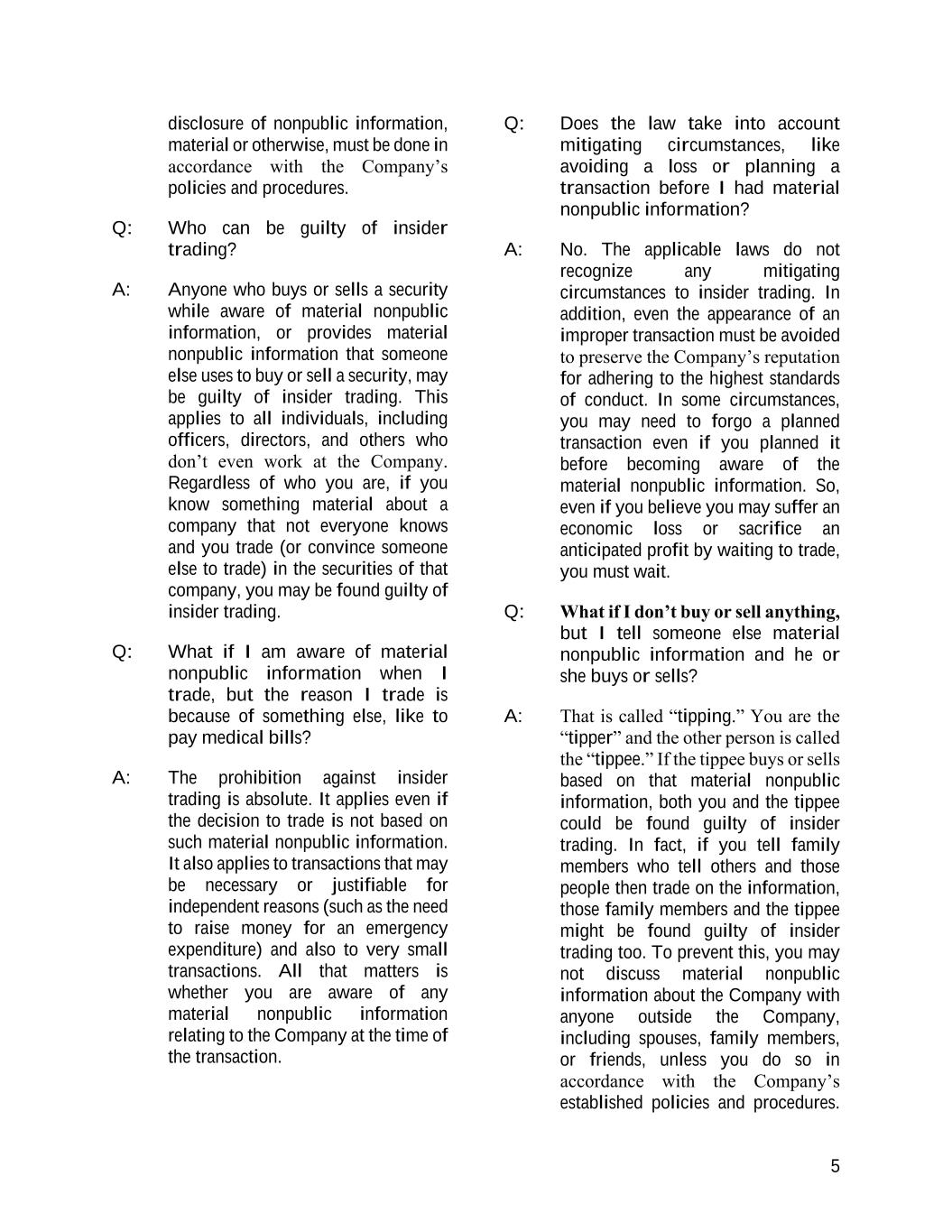
5 disclosure of nonpublic information, material or otherwise, must be done in accordance with the Company’s policies and procedures. Q: Who can be guilty of insider trading? A: Anyone who buys or sells a security while aware of material nonpublic information, or provides material nonpublic information that someone else uses to buy or sell a security, may be guilty of insider trading. This applies to all individuals, including officers, directors, and others who don’t even work at the Company. Regardless of who you are, if you know something material about a company that not everyone knows and you trade (or convince someone else to trade) in the securities of that company, you may be found guilty of insider trading. Q: What if I am aware of material nonpublic information when I trade, but the reason I trade is because of something else, like to pay medical bills? A: The prohibition against insider trading is absolute. It applies even if the decision to trade is not based on such material nonpublic information. It also applies to transactions that may be necessary or justifiable for independent reasons (such as the need to raise money for an emergency expenditure) and also to very small transactions. All that matters is whether you are aware of any material nonpublic information relating to the Company at the time of the transaction. Q: Does the law take into account mitigating circumstances, like avoiding a loss or planning a transaction before I had material nonpublic information? A: No. The applicable laws do not recognize any mitigating circumstances to insider trading. In addition, even the appearance of an improper transaction must be avoided to preserve the Company’s reputation for adhering to the highest standards of conduct. In some circumstances, you may need to forgo a planned transaction even if you planned it before becoming aware of the material nonpublic information. So, even if you believe you may suffer an economic loss or sacrifice an anticipated profit by waiting to trade, you must wait. Q: What if I don’t buy or sell anything, but I tell someone else material nonpublic information and he or she buys or sells? A: That is called “tipping.” You are the “tipper” and the other person is called the “tippee.” If the tippee buys or sells based on that material nonpublic information, both you and the tippee could be found guilty of insider trading. In fact, if you tell family members who tell others and those people then trade on the information, those family members and the tippee might be found guilty of insider trading too. To prevent this, you may not discuss material nonpublic information about the Company with anyone outside the Company, including spouses, family members, or friends, unless you do so in accordance with the Company’s established policies and procedures.
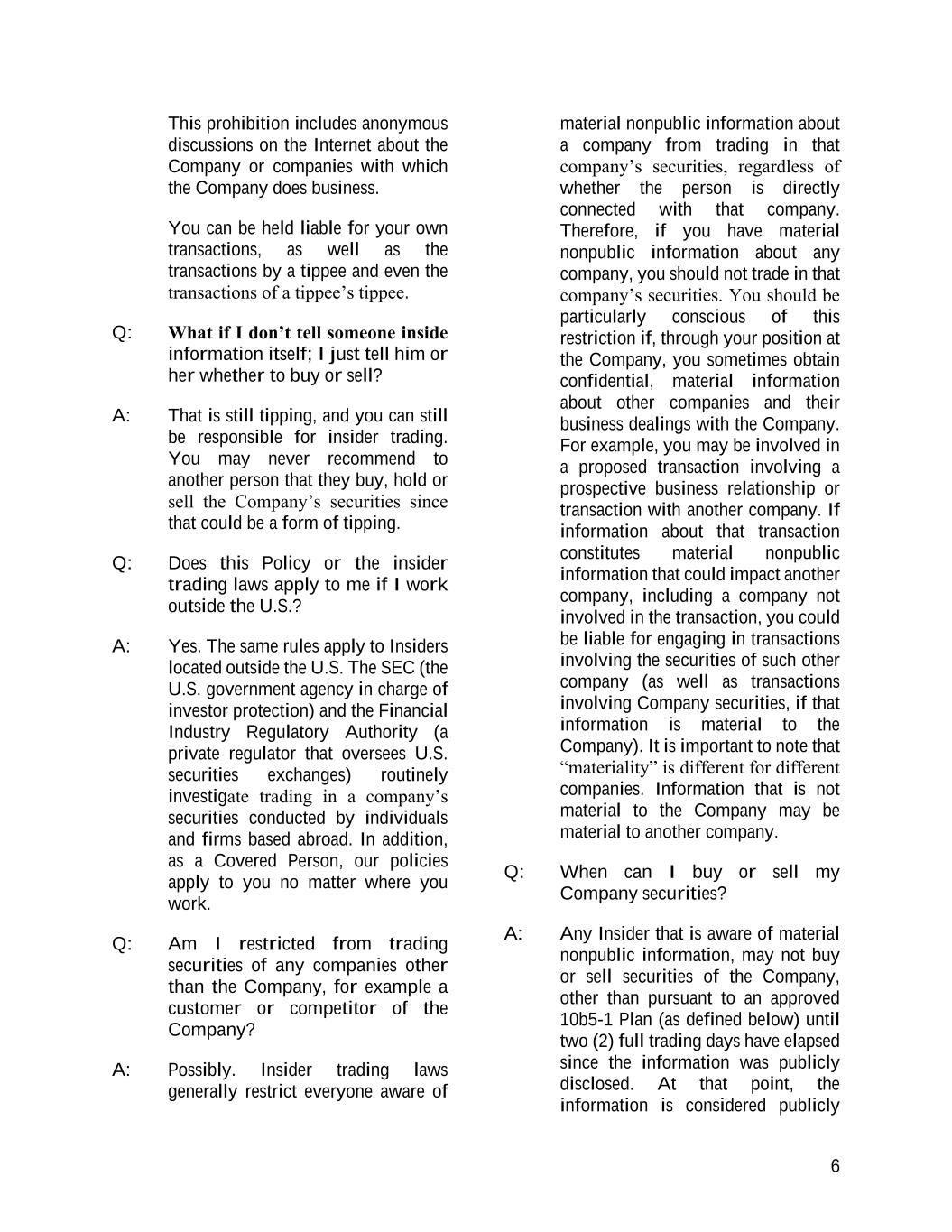
6 This prohibition includes anonymous discussions on the Internet about the Company or companies with which the Company does business. You can be held liable for your own transactions, as well as the transactions by a tippee and even the transactions of a tippee’s tippee. Q: What if I don’t tell someone inside information itself; I just tell him or her whether to buy or sell? A: That is still tipping, and you can still be responsible for insider trading. You may never recommend to another person that they buy, hold or sell the Company’s securities since that could be a form of tipping. Q: Does this Policy or the insider trading laws apply to me if I work outside the U.S.? A: Yes. The same rules apply to Insiders located outside the U.S. The SEC (the U.S. government agency in charge of investor protection) and the Financial Industry Regulatory Authority (a private regulator that oversees U.S. securities exchanges) routinely investigate trading in a company’s securities conducted by individuals and firms based abroad. In addition, as a Covered Person, our policies apply to you no matter where you work. Q: Am I restricted from trading securities of any companies other than the Company, for example a customer or competitor of the Company? A: Possibly. Insider trading laws generally restrict everyone aware of material nonpublic information about a company from trading in that company’s securities, regardless of whether the person is directly connected with that company. Therefore, if you have material nonpublic information about any company, you should not trade in that company’s securities. You should be particularly conscious of this restriction if, through your position at the Company, you sometimes obtain confidential, material information about other companies and their business dealings with the Company. For example, you may be involved in a proposed transaction involving a prospective business relationship or transaction with another company. If information about that transaction constitutes material nonpublic information that could impact another company, including a company not involved in the transaction, you could be liable for engaging in transactions involving the securities of such other company (as well as transactions involving Company securities, if that information is material to the Company). It is important to note that “materiality” is different for different companies. Information that is not material to the Company may be material to another company. Q: When can I buy or sell my Company securities? A: Any Insider that is aware of material nonpublic information, may not buy or sell securities of the Company, other than pursuant to an approved 10b5-1 Plan (as defined below) until two (2) full trading days have elapsed since the information was publicly disclosed. At that point, the information is considered publicly
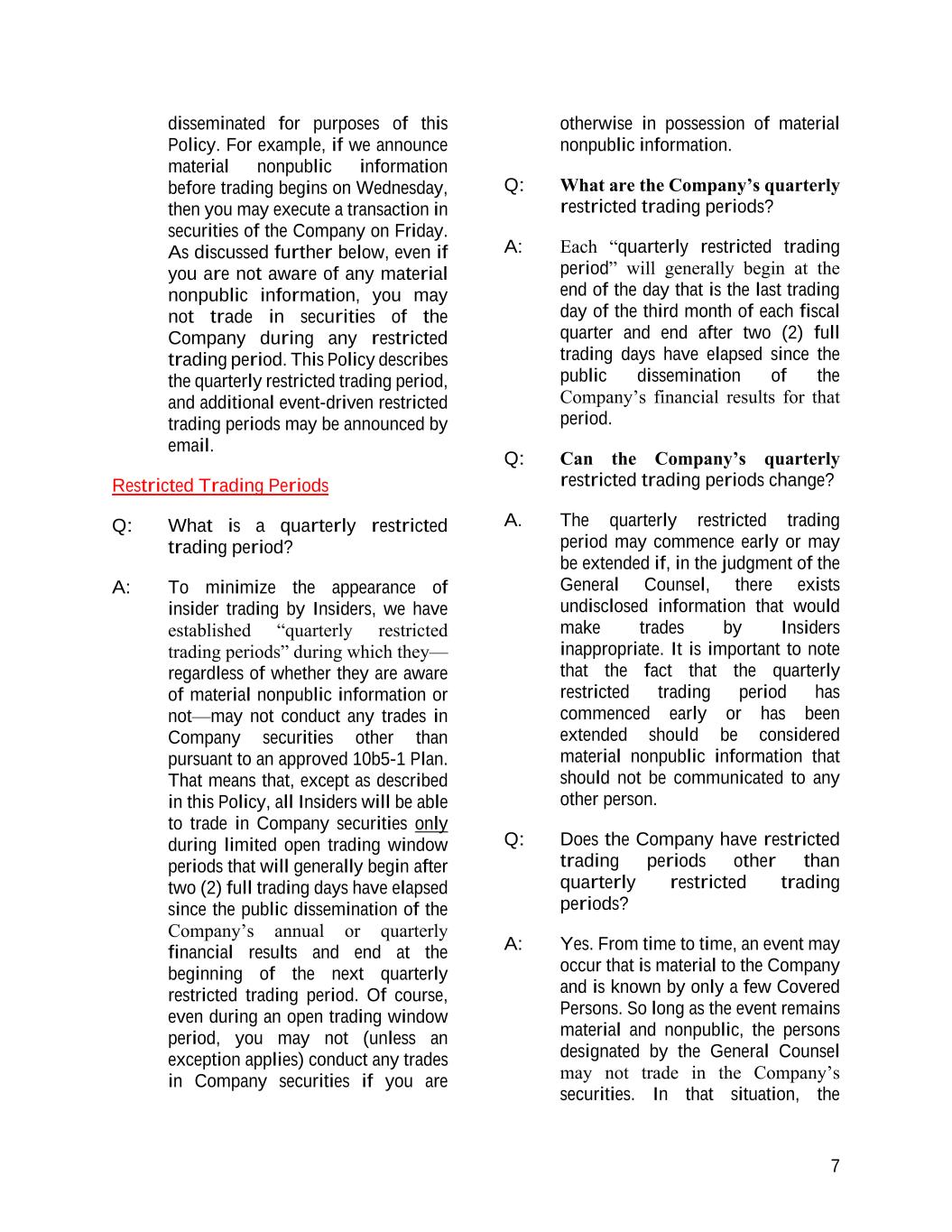
7 disseminated for purposes of this Policy. For example, if we announce material nonpublic information before trading begins on Wednesday, then you may execute a transaction in securities of the Company on Friday. As discussed further below, even if you are not aware of any material nonpublic information, you may not trade in securities of the Company during any restricted trading period. This Policy describes the quarterly restricted trading period, and additional event-driven restricted trading periods may be announced by email. Restricted Trading Periods Q: What is a quarterly restricted trading period? A: To minimize the appearance of insider trading by Insiders, we have established “quarterly restricted trading periods” during which they— regardless of whether they are aware of material nonpublic information or not—may not conduct any trades in Company securities other than pursuant to an approved 10b5-1 Plan. That means that, except as described in this Policy, all Insiders will be able to trade in Company securities only during limited open trading window periods that will generally begin after two (2) full trading days have elapsed since the public dissemination of the Company’s annual or quarterly financial results and end at the beginning of the next quarterly restricted trading period. Of course, even during an open trading window period, you may not (unless an exception applies) conduct any trades in Company securities if you are otherwise in possession of material nonpublic information. Q: What are the Company’s quarterly restricted trading periods? A: Each “quarterly restricted trading period” will generally begin at the end of the day that is the last trading day of the third month of each fiscal quarter and end after two (2) full trading days have elapsed since the public dissemination of the Company’s financial results for that period. Q: Can the Company’s quarterly restricted trading periods change? A. The quarterly restricted trading period may commence early or may be extended if, in the judgment of the General Counsel, there exists undisclosed information that would make trades by Insiders inappropriate. It is important to note that the fact that the quarterly restricted trading period has commenced early or has been extended should be considered material nonpublic information that should not be communicated to any other person. Q: Does the Company have restricted trading periods other than quarterly restricted trading periods? A: Yes. From time to time, an event may occur that is material to the Company and is known by only a few Covered Persons. So long as the event remains material and nonpublic, the persons designated by the General Counsel may not trade in the Company’s securities. In that situation, the
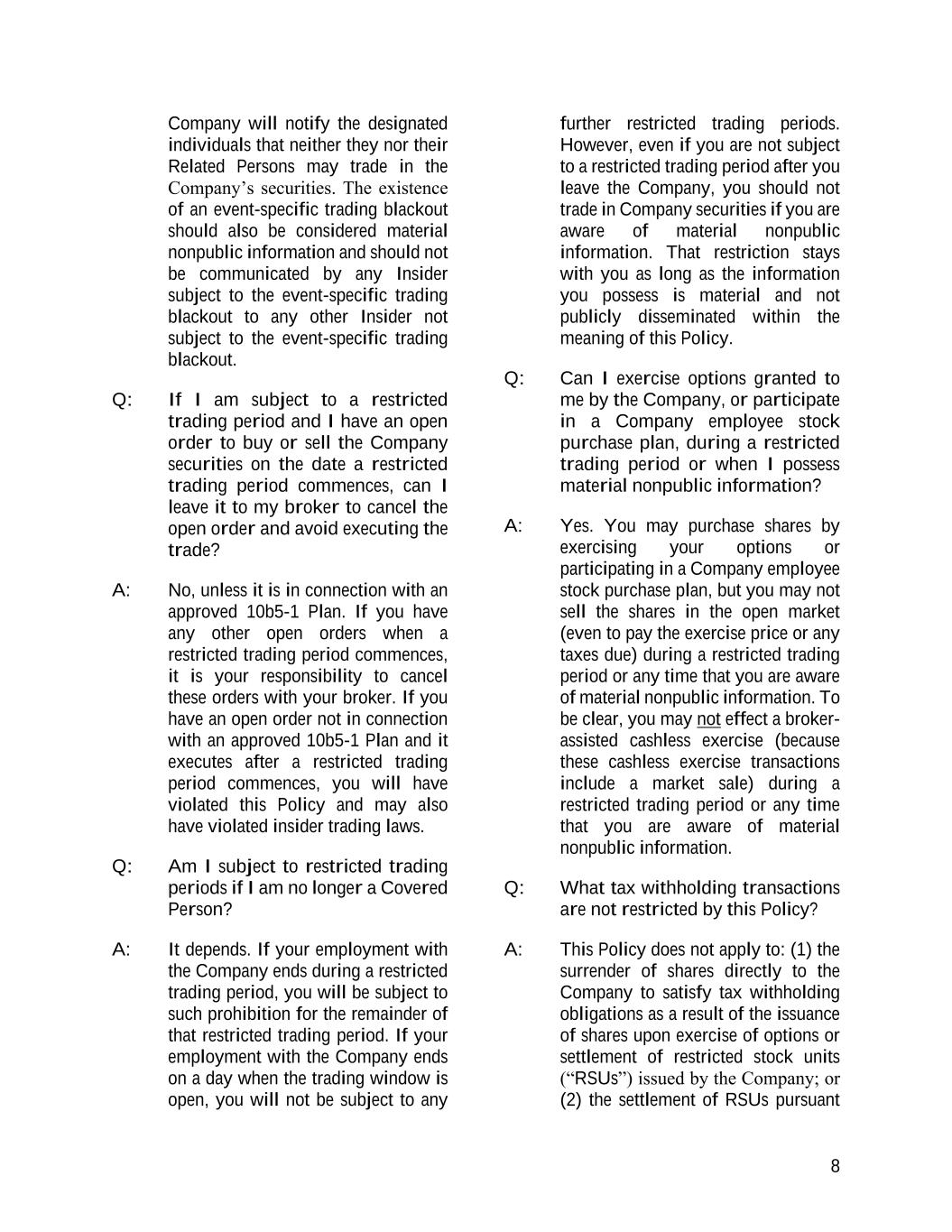
8 Company will notify the designated individuals that neither they nor their Related Persons may trade in the Company’s securities. The existence of an event-specific trading blackout should also be considered material nonpublic information and should not be communicated by any Insider subject to the event-specific trading blackout to any other Insider not subject to the event-specific trading blackout. Q: If I am subject to a restricted trading period and I have an open order to buy or sell the Company securities on the date a restricted trading period commences, can I leave it to my broker to cancel the open order and avoid executing the trade? A: No, unless it is in connection with an approved 10b5-1 Plan. If you have any other open orders when a restricted trading period commences, it is your responsibility to cancel these orders with your broker. If you have an open order not in connection with an approved 10b5-1 Plan and it executes after a restricted trading period commences, you will have violated this Policy and may also have violated insider trading laws. Q: Am I subject to restricted trading periods if I am no longer a Covered Person? A: It depends. If your employment with the Company ends during a restricted trading period, you will be subject to such prohibition for the remainder of that restricted trading period. If your employment with the Company ends on a day when the trading window is open, you will not be subject to any further restricted trading periods. However, even if you are not subject to a restricted trading period after you leave the Company, you should not trade in Company securities if you are aware of material nonpublic information. That restriction stays with you as long as the information you possess is material and not publicly disseminated within the meaning of this Policy. Q: Can I exercise options granted to me by the Company, or participate in a Company employee stock purchase plan, during a restricted trading period or when I possess material nonpublic information? A: Yes. You may purchase shares by exercising your options or participating in a Company employee stock purchase plan, but you may not sell the shares in the open market (even to pay the exercise price or any taxes due) during a restricted trading period or any time that you are aware of material nonpublic information. To be clear, you may not effect a broker- assisted cashless exercise (because these cashless exercise transactions include a market sale) during a restricted trading period or any time that you are aware of material nonpublic information. Q: What tax withholding transactions are not restricted by this Policy? A: This Policy does not apply to: (1) the surrender of shares directly to the Company to satisfy tax withholding obligations as a result of the issuance of shares upon exercise of options or settlement of restricted stock units (“RSUs”) issued by the Company; or (2) the settlement of RSUs pursuant
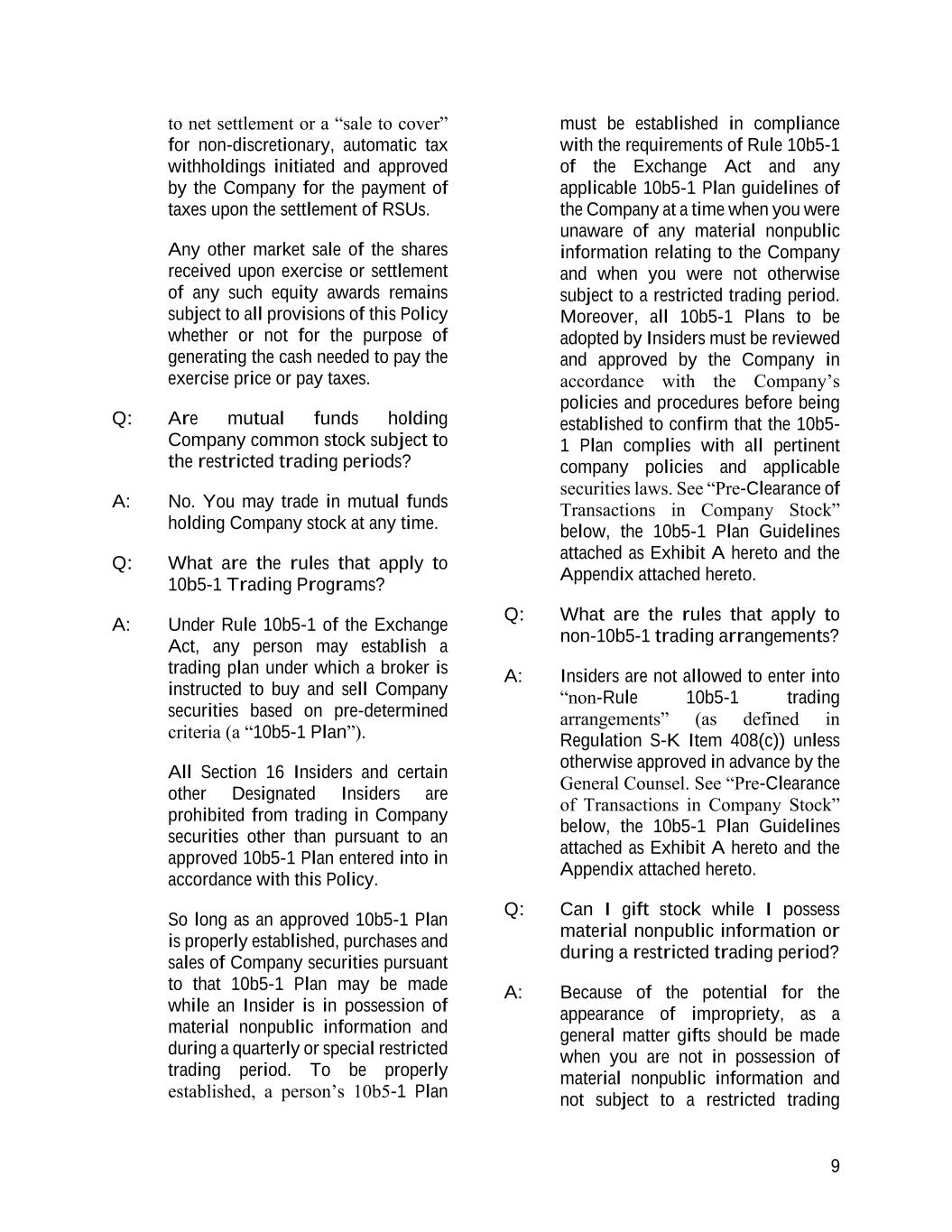
9 to net settlement or a “sale to cover” for non-discretionary, automatic tax withholdings initiated and approved by the Company for the payment of taxes upon the settlement of RSUs. Any other market sale of the shares received upon exercise or settlement of any such equity awards remains subject to all provisions of this Policy whether or not for the purpose of generating the cash needed to pay the exercise price or pay taxes. Q: Are mutual funds holding Company common stock subject to the restricted trading periods? A: No. You may trade in mutual funds holding Company stock at any time. Q: What are the rules that apply to 10b5-1 Trading Programs? A: Under Rule 10b5-1 of the Exchange Act, any person may establish a trading plan under which a broker is instructed to buy and sell Company securities based on pre-determined criteria (a “10b5-1 Plan”). All Section 16 Insiders and certain other Designated Insiders are prohibited from trading in Company securities other than pursuant to an approved 10b5-1 Plan entered into in accordance with this Policy. So long as an approved 10b5-1 Plan is properly established, purchases and sales of Company securities pursuant to that 10b5-1 Plan may be made while an Insider is in possession of material nonpublic information and during a quarterly or special restricted trading period. To be properly established, a person’s 10b5-1 Plan must be established in compliance with the requirements of Rule 10b5-1 of the Exchange Act and any applicable 10b5-1 Plan guidelines of the Company at a time when you were unaware of any material nonpublic information relating to the Company and when you were not otherwise subject to a restricted trading period. Moreover, all 10b5-1 Plans to be adopted by Insiders must be reviewed and approved by the Company in accordance with the Company’s policies and procedures before being established to confirm that the 10b5- 1 Plan complies with all pertinent company policies and applicable securities laws. See “Pre-Clearance of Transactions in Company Stock” below, the 10b5-1 Plan Guidelines attached as Exhibit A hereto and the Appendix attached hereto. Q: What are the rules that apply to non-10b5-1 trading arrangements? A: Insiders are not allowed to enter into “non-Rule 10b5-1 trading arrangements” (as defined in Regulation S-K Item 408(c)) unless otherwise approved in advance by the General Counsel. See “Pre-Clearance of Transactions in Company Stock” below, the 10b5-1 Plan Guidelines attached as Exhibit A hereto and the Appendix attached hereto. Q: Can I gift stock while I possess material nonpublic information or during a restricted trading period? A: Because of the potential for the appearance of impropriety, as a general matter gifts should be made when you are not in possession of material nonpublic information and not subject to a restricted trading
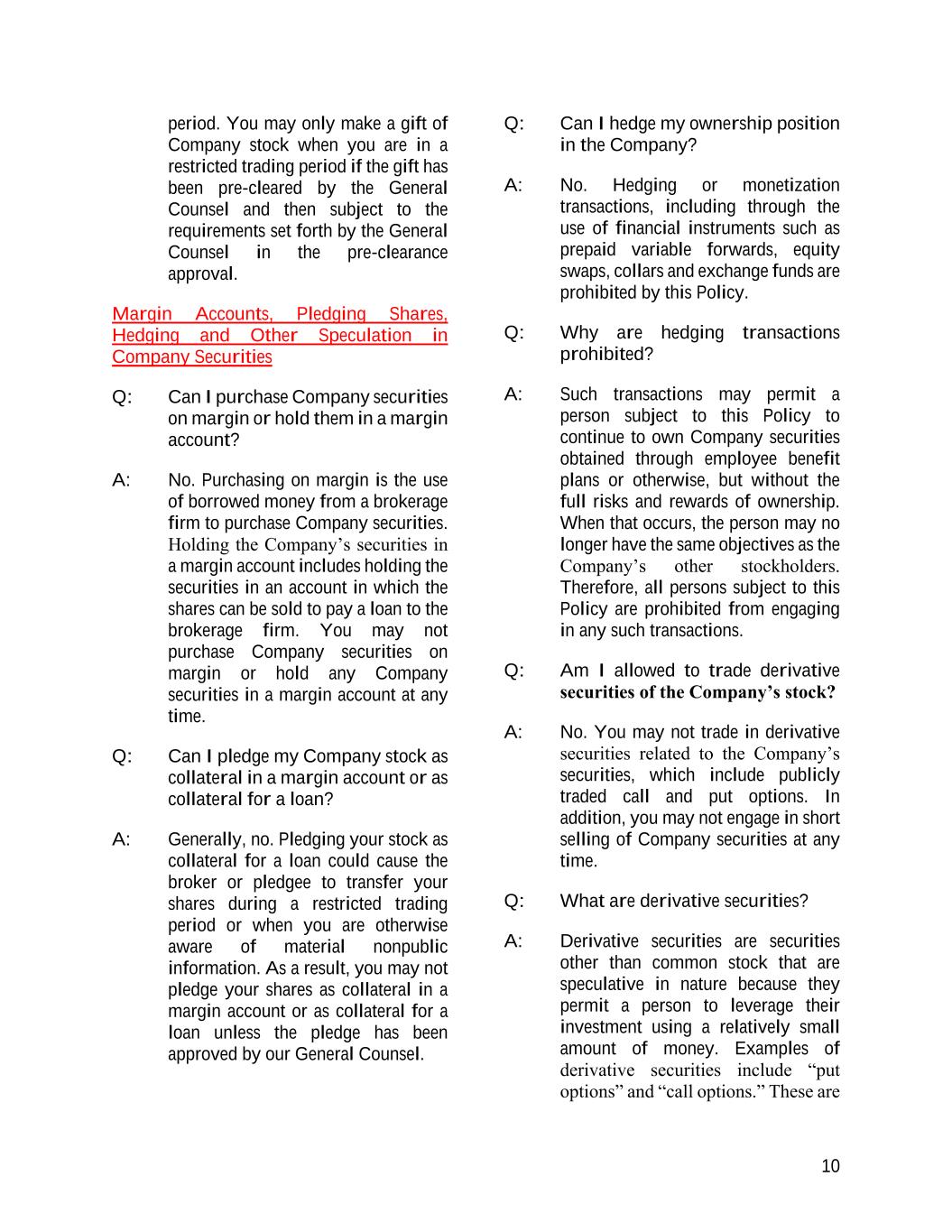
10 period. You may only make a gift of Company stock when you are in a restricted trading period if the gift has been pre-cleared by the General Counsel and then subject to the requirements set forth by the General Counsel in the pre-clearance approval. Margin Accounts, Pledging Shares, Hedging and Other Speculation in Company Securities Q: Can I purchase Company securities on margin or hold them in a margin account? A: No. Purchasing on margin is the use of borrowed money from a brokerage firm to purchase Company securities. Holding the Company’s securities in a margin account includes holding the securities in an account in which the shares can be sold to pay a loan to the brokerage firm. You may not purchase Company securities on margin or hold any Company securities in a margin account at any time. Q: Can I pledge my Company stock as collateral in a margin account or as collateral for a loan? A: Generally, no. Pledging your stock as collateral for a loan could cause the broker or pledgee to transfer your shares during a restricted trading period or when you are otherwise aware of material nonpublic information. As a result, you may not pledge your shares as collateral in a margin account or as collateral for a loan unless the pledge has been approved by our General Counsel. Q: Can I hedge my ownership position in the Company? A: No. Hedging or monetization transactions, including through the use of financial instruments such as prepaid variable forwards, equity swaps, collars and exchange funds are prohibited by this Policy. Q: Why are hedging transactions prohibited? A: Such transactions may permit a person subject to this Policy to continue to own Company securities obtained through employee benefit plans or otherwise, but without the full risks and rewards of ownership. When that occurs, the person may no longer have the same objectives as the Company’s other stockholders. Therefore, all persons subject to this Policy are prohibited from engaging in any such transactions. Q: Am I allowed to trade derivative securities of the Company’s stock? A: No. You may not trade in derivative securities related to the Company’s securities, which include publicly traded call and put options. In addition, you may not engage in short selling of Company securities at any time. Q: What are derivative securities? A: Derivative securities are securities other than common stock that are speculative in nature because they permit a person to leverage their investment using a relatively small amount of money. Examples of derivative securities include “put options” and “call options.” These are
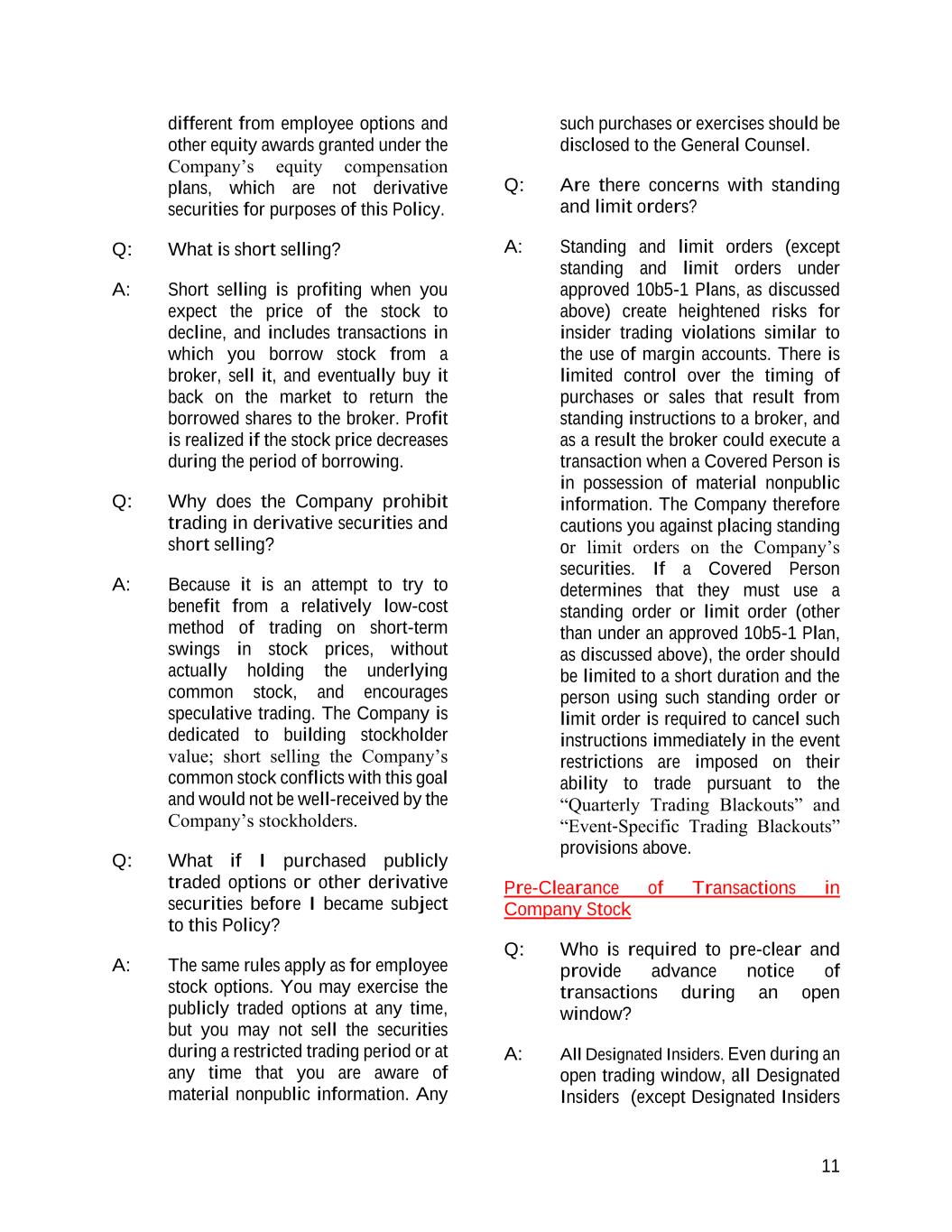
11 different from employee options and other equity awards granted under the Company’s equity compensation plans, which are not derivative securities for purposes of this Policy. Q: What is short selling? A: Short selling is profiting when you expect the price of the stock to decline, and includes transactions in which you borrow stock from a broker, sell it, and eventually buy it back on the market to return the borrowed shares to the broker. Profit is realized if the stock price decreases during the period of borrowing. Q: Why does the Company prohibit trading in derivative securities and short selling? A: Because it is an attempt to try to benefit from a relatively low-cost method of trading on short-term swings in stock prices, without actually holding the underlying common stock, and encourages speculative trading. The Company is dedicated to building stockholder value; short selling the Company’s common stock conflicts with this goal and would not be well-received by the Company’s stockholders. Q: What if I purchased publicly traded options or other derivative securities before I became subject to this Policy? A: The same rules apply as for employee stock options. You may exercise the publicly traded options at any time, but you may not sell the securities during a restricted trading period or at any time that you are aware of material nonpublic information. Any such purchases or exercises should be disclosed to the General Counsel. Q: Are there concerns with standing and limit orders? A: Standing and limit orders (except standing and limit orders under approved 10b5-1 Plans, as discussed above) create heightened risks for insider trading violations similar to the use of margin accounts. There is limited control over the timing of purchases or sales that result from standing instructions to a broker, and as a result the broker could execute a transaction when a Covered Person is in possession of material nonpublic information. The Company therefore cautions you against placing standing or limit orders on the Company’s securities. If a Covered Person determines that they must use a standing order or limit order (other than under an approved 10b5-1 Plan, as discussed above), the order should be limited to a short duration and the person using such standing order or limit order is required to cancel such instructions immediately in the event restrictions are imposed on their ability to trade pursuant to the “Quarterly Trading Blackouts” and “Event-Specific Trading Blackouts” provisions above. Pre-Clearance of Transactions in Company Stock Q: Who is required to pre-clear and provide advance notice of transactions during an open window? A: All Designated Insiders. Even during an open trading window, all Designated Insiders (except Designated Insiders
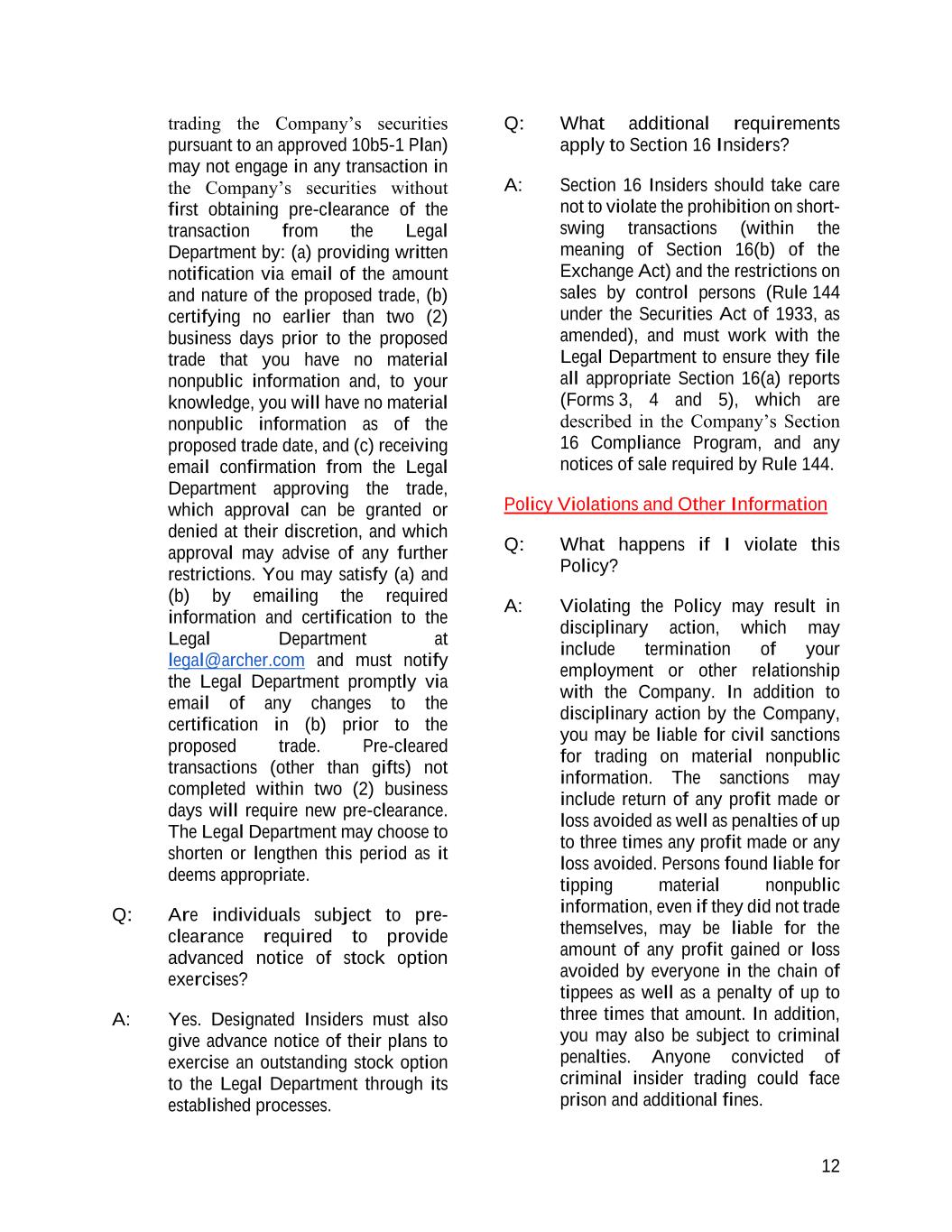
12 trading the Company’s securities pursuant to an approved 10b5-1 Plan) may not engage in any transaction in the Company’s securities without first obtaining pre-clearance of the transaction from the Legal Department by: (a) providing written notification via email of the amount and nature of the proposed trade, (b) certifying no earlier than two (2) business days prior to the proposed trade that you have no material nonpublic information and, to your knowledge, you will have no material nonpublic information as of the proposed trade date, and (c) receiving email confirmation from the Legal Department approving the trade, which approval can be granted or denied at their discretion, and which approval may advise of any further restrictions. You may satisfy (a) and (b) by emailing the required information and certification to the Legal Department at legal@archer.com and must notify the Legal Department promptly via email of any changes to the certification in (b) prior to the proposed trade. Pre-cleared transactions (other than gifts) not completed within two (2) business days will require new pre-clearance. The Legal Department may choose to shorten or lengthen this period as it deems appropriate. Q: Are individuals subject to pre- clearance required to provide advanced notice of stock option exercises? A: Yes. Designated Insiders must also give advance notice of their plans to exercise an outstanding stock option to the Legal Department through its established processes. Q: What additional requirements apply to Section 16 Insiders? A: Section 16 Insiders should take care not to violate the prohibition on short- swing transactions (within the meaning of Section 16(b) of the Exchange Act) and the restrictions on sales by control persons (Rule 144 under the Securities Act of 1933, as amended), and must work with the Legal Department to ensure they file all appropriate Section 16(a) reports (Forms 3, 4 and 5), which are described in the Company’s Section 16 Compliance Program, and any notices of sale required by Rule 144. Policy Violations and Other Information Q: What happens if I violate this Policy? A: Violating the Policy may result in disciplinary action, which may include termination of your employment or other relationship with the Company. In addition to disciplinary action by the Company, you may be liable for civil sanctions for trading on material nonpublic information. The sanctions may include return of any profit made or loss avoided as well as penalties of up to three times any profit made or any loss avoided. Persons found liable for tipping material nonpublic information, even if they did not trade themselves, may be liable for the amount of any profit gained or loss avoided by everyone in the chain of tippees as well as a penalty of up to three times that amount. In addition, you may also be subject to criminal penalties. Anyone convicted of criminal insider trading could face prison and additional fines.
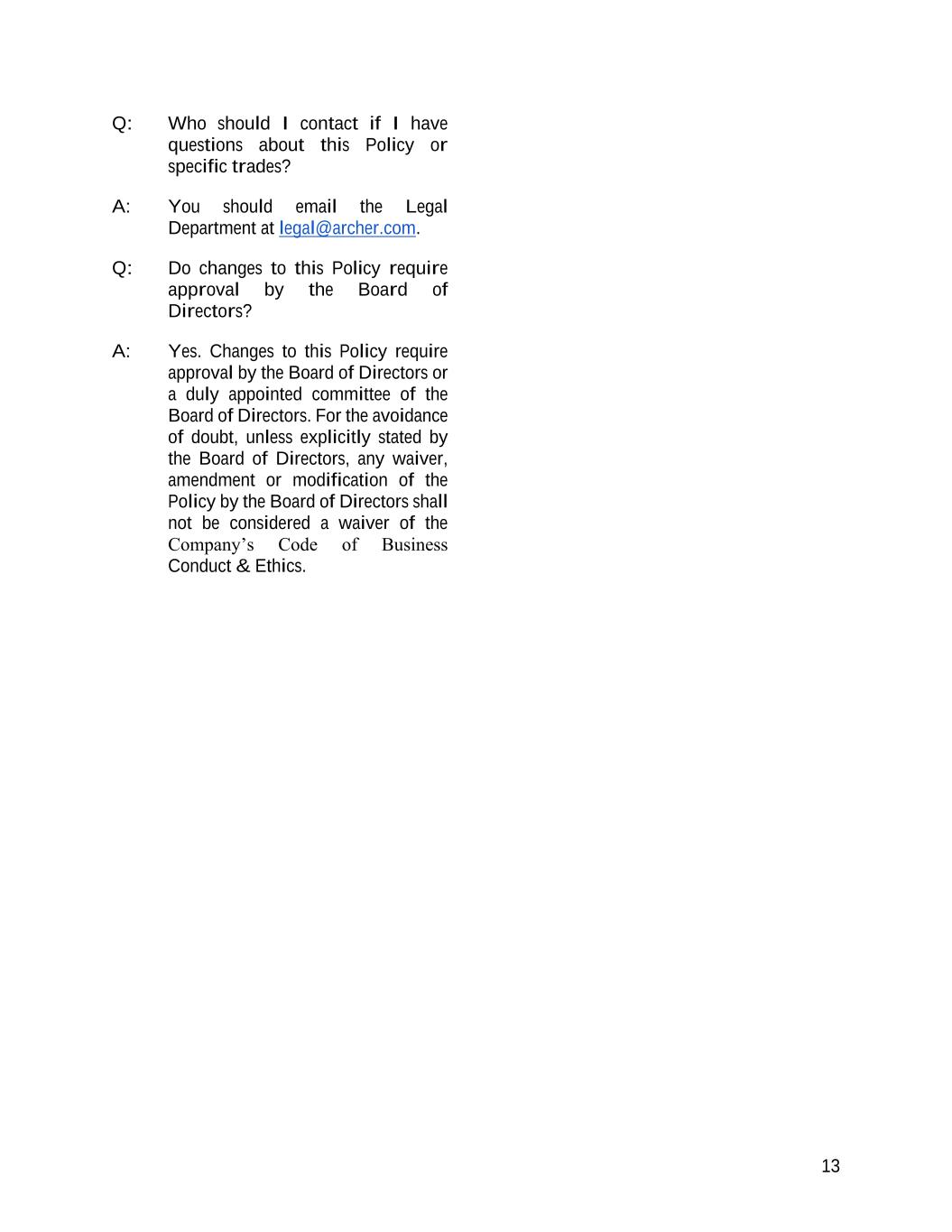
13 Q: Who should I contact if I have questions about this Policy or specific trades? A: You should email the Legal Department at legal@archer.com. Q: Do changes to this Policy require approval by the Board of Directors? A: Yes. Changes to this Policy require approval by the Board of Directors or a duly appointed committee of the Board of Directors. For the avoidance of doubt, unless explicitly stated by the Board of Directors, any waiver, amendment or modification of the Policy by the Board of Directors shall not be considered a waiver of the Company’s Code of Business Conduct & Ethics.
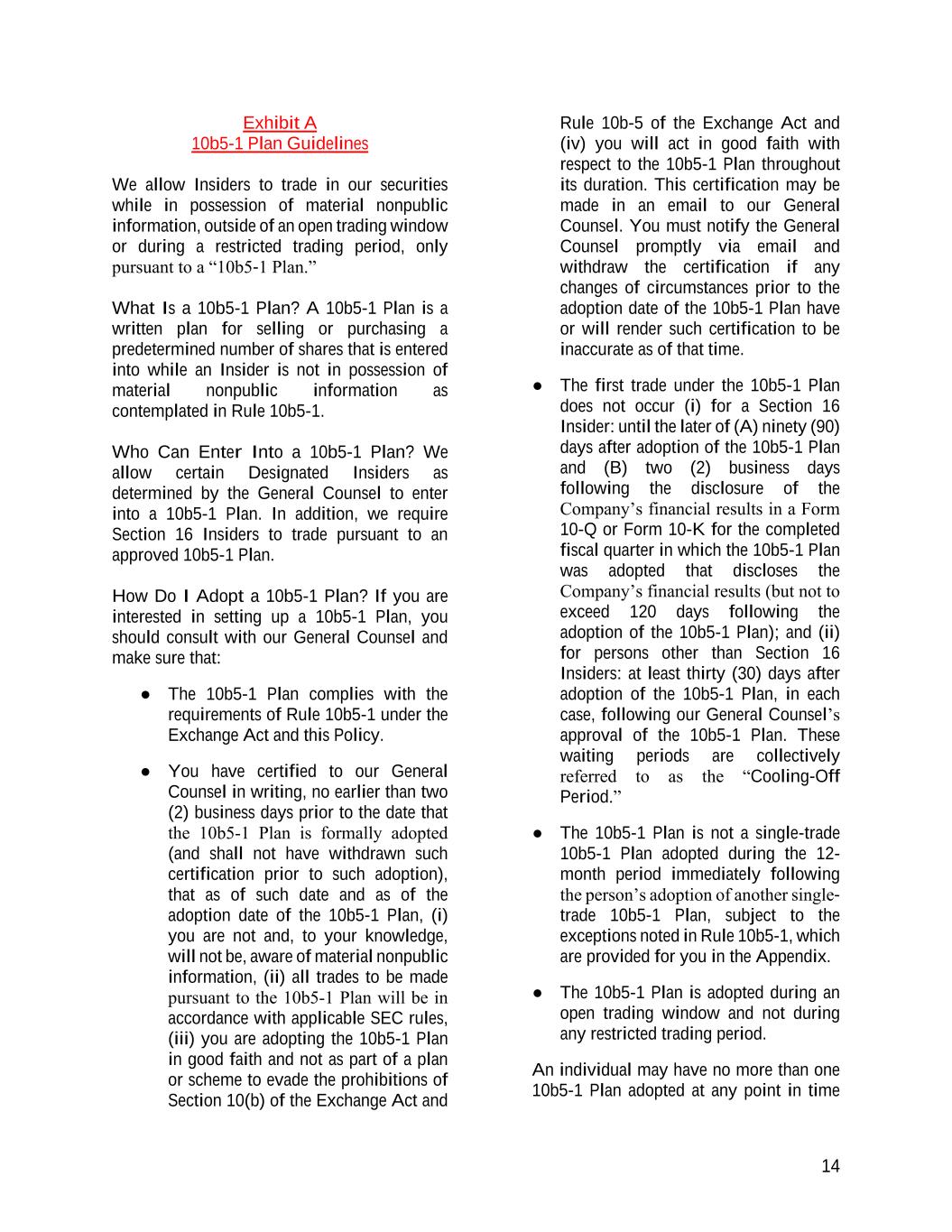
14 Exhibit A 10b5-1 Plan Guidelines We allow Insiders to trade in our securities while in possession of material nonpublic information, outside of an open trading window or during a restricted trading period, only pursuant to a “10b5-1 Plan.” What Is a 10b5-1 Plan? A 10b5-1 Plan is a written plan for selling or purchasing a predetermined number of shares that is entered into while an Insider is not in possession of material nonpublic information as contemplated in Rule 10b5-1. Who Can Enter Into a 10b5-1 Plan? We allow certain Designated Insiders as determined by the General Counsel to enter into a 10b5-1 Plan. In addition, we require Section 16 Insiders to trade pursuant to an approved 10b5-1 Plan. How Do I Adopt a 10b5-1 Plan? If you are interested in setting up a 10b5-1 Plan, you should consult with our General Counsel and make sure that: ● The 10b5-1 Plan complies with the requirements of Rule 10b5-1 under the Exchange Act and this Policy. ● You have certified to our General Counsel in writing, no earlier than two (2) business days prior to the date that the 10b5‑1 Plan is formally adopted (and shall not have withdrawn such certification prior to such adoption), that as of such date and as of the adoption date of the 10b5-1 Plan, (i) you are not and, to your knowledge, will not be, aware of material nonpublic information, (ii) all trades to be made pursuant to the 10b5‑1 Plan will be in accordance with applicable SEC rules, (iii) you are adopting the 10b5-1 Plan in good faith and not as part of a plan or scheme to evade the prohibitions of Section 10(b) of the Exchange Act and Rule 10b-5 of the Exchange Act and (iv) you will act in good faith with respect to the 10b5-1 Plan throughout its duration. This certification may be made in an email to our General Counsel. You must notify the General Counsel promptly via email and withdraw the certification if any changes of circumstances prior to the adoption date of the 10b5-1 Plan have or will render such certification to be inaccurate as of that time. ● The first trade under the 10b5-1 Plan does not occur (i) for a Section 16 Insider: until the later of (A) ninety (90) days after adoption of the 10b5-1 Plan and (B) two (2) business days following the disclosure of the Company’s financial results in a Form 10-Q or Form 10-K for the completed fiscal quarter in which the 10b5-1 Plan was adopted that discloses the Company’s financial results (but not to exceed 120 days following the adoption of the 10b5-1 Plan); and (ii) for persons other than Section 16 Insiders: at least thirty (30) days after adoption of the 10b5-1 Plan, in each case, following our General Counsel’s approval of the 10b5-1 Plan. These waiting periods are collectively referred to as the “Cooling-Off Period.” ● The 10b5-1 Plan is not a single-trade 10b5-1 Plan adopted during the 12- month period immediately following the person’s adoption of another single- trade 10b5-1 Plan, subject to the exceptions noted in Rule 10b5-1, which are provided for you in the Appendix. ● The 10b5-1 Plan is adopted during an open trading window and not during any restricted trading period. An individual may have no more than one 10b5-1 Plan adopted at any point in time
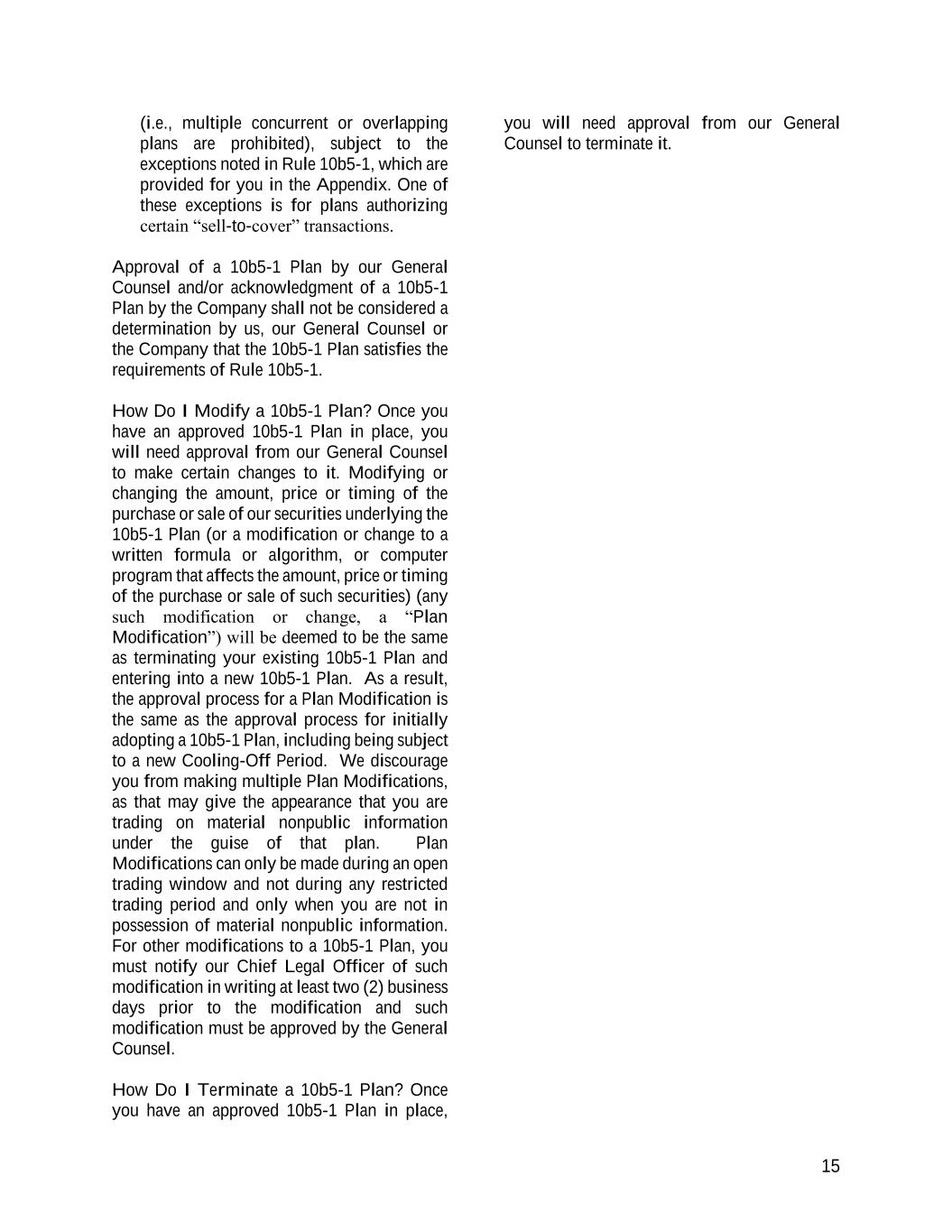
15 (i.e., multiple concurrent or overlapping plans are prohibited), subject to the exceptions noted in Rule 10b5-1, which are provided for you in the Appendix. One of these exceptions is for plans authorizing certain “sell-to-cover” transactions. Approval of a 10b5-1 Plan by our General Counsel and/or acknowledgment of a 10b5-1 Plan by the Company shall not be considered a determination by us, our General Counsel or the Company that the 10b5-1 Plan satisfies the requirements of Rule 10b5-1. How Do I Modify a 10b5-1 Plan? Once you have an approved 10b5-1 Plan in place, you will need approval from our General Counsel to make certain changes to it. Modifying or changing the amount, price or timing of the purchase or sale of our securities underlying the 10b5-1 Plan (or a modification or change to a written formula or algorithm, or computer program that affects the amount, price or timing of the purchase or sale of such securities) (any such modification or change, a “Plan Modification”) will be deemed to be the same as terminating your existing 10b5-1 Plan and entering into a new 10b5-1 Plan. As a result, the approval process for a Plan Modification is the same as the approval process for initially adopting a 10b5-1 Plan, including being subject to a new Cooling-Off Period. We discourage you from making multiple Plan Modifications, as that may give the appearance that you are trading on material nonpublic information under the guise of that plan. Plan Modifications can only be made during an open trading window and not during any restricted trading period and only when you are not in possession of material nonpublic information. For other modifications to a 10b5-1 Plan, you must notify our Chief Legal Officer of such modification in writing at least two (2) business days prior to the modification and such modification must be approved by the General Counsel. How Do I Terminate a 10b5-1 Plan? Once you have an approved 10b5-1 Plan in place, you will need approval from our General Counsel to terminate it.
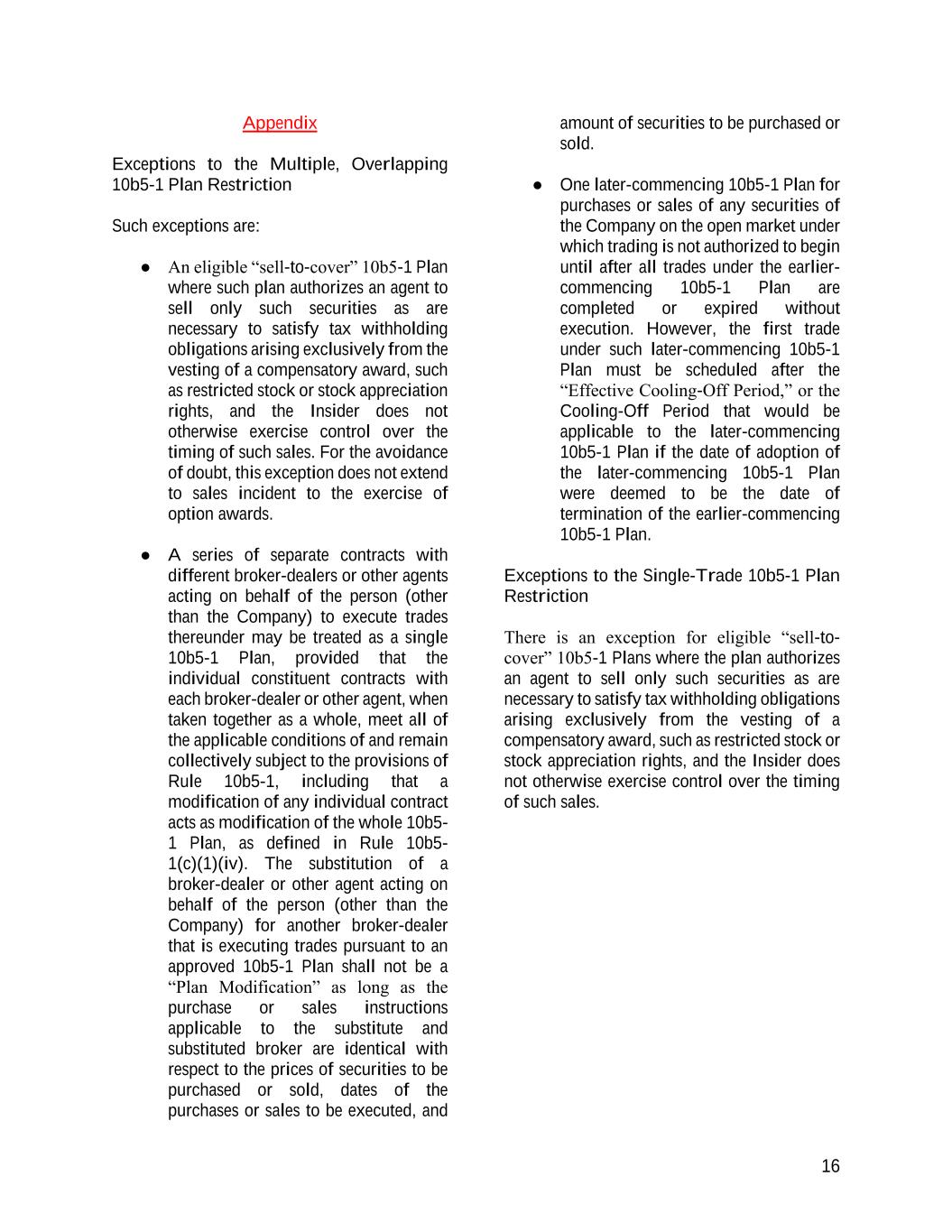
16 Appendix Exceptions to the Multiple, Overlapping 10b5-1 Plan Restriction Such exceptions are: ● An eligible “sell-to-cover” 10b5-1 Plan where such plan authorizes an agent to sell only such securities as are necessary to satisfy tax withholding obligations arising exclusively from the vesting of a compensatory award, such as restricted stock or stock appreciation rights, and the Insider does not otherwise exercise control over the timing of such sales. For the avoidance of doubt, this exception does not extend to sales incident to the exercise of option awards. ● A series of separate contracts with different broker-dealers or other agents acting on behalf of the person (other than the Company) to execute trades thereunder may be treated as a single 10b5-1 Plan, provided that the individual constituent contracts with each broker-dealer or other agent, when taken together as a whole, meet all of the applicable conditions of and remain collectively subject to the provisions of Rule 10b5-1, including that a modification of any individual contract acts as modification of the whole 10b5- 1 Plan, as defined in Rule 10b5- 1(c)(1)(iv). The substitution of a broker-dealer or other agent acting on behalf of the person (other than the Company) for another broker-dealer that is executing trades pursuant to an approved 10b5-1 Plan shall not be a “Plan Modification” as long as the purchase or sales instructions applicable to the substitute and substituted broker are identical with respect to the prices of securities to be purchased or sold, dates of the purchases or sales to be executed, and amount of securities to be purchased or sold. ● One later-commencing 10b5-1 Plan for purchases or sales of any securities of the Company on the open market under which trading is not authorized to begin until after all trades under the earlier- commencing 10b5-1 Plan are completed or expired without execution. However, the first trade under such later-commencing 10b5-1 Plan must be scheduled after the “Effective Cooling-Off Period,” or the Cooling-Off Period that would be applicable to the later-commencing 10b5-1 Plan if the date of adoption of the later-commencing 10b5-1 Plan were deemed to be the date of termination of the earlier-commencing 10b5-1 Plan. Exceptions to the Single-Trade 10b5-1 Plan Restriction There is an exception for eligible “sell-to- cover” 10b5-1 Plans where the plan authorizes an agent to sell only such securities as are necessary to satisfy tax withholding obligations arising exclusively from the vesting of a compensatory award, such as restricted stock or stock appreciation rights, and the Insider does not otherwise exercise control over the timing of such sales.















